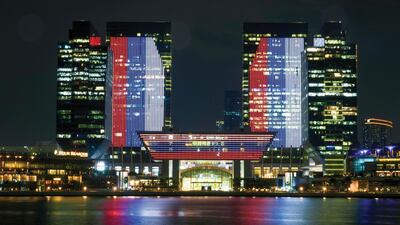Abu Dhabi has recorded an increased demand for office space, meaning it must build more Grade A assets, according to a new report by property consultancy Savills.
The growing private sector, rising business confidence and foreign direct investment continue to draw investors and foreign professionals to the UAE’s capital city, leading to higher demand for commercial office space, the report found.
The report said that the current lack of Grade A assets is the biggest challenge for the office market in the capital, but added that work was already being carried out to establish more premium office spaces.
“The city has more than 90,000 square metres in the pipeline till 2026 from prominent developers across projects like The Link Masdar City, Masdar City Square, and the HB Office Tower from Aldar,” Savills said.
“Most of these upcoming projects have recorded healthy pre-commitment rates due to the high demand.”
The need for office space in Abu Dhabi is driven by established locations such as Maryah Island, the Capital Centre, Masdar City, and Al Raha, the Savills report said.
The prominent Grade A office assets such as Abu Dhabi Global Market and the International Tower are operating at about 95 per cent occupancy, it added.
Abu Dhabi’s economy grew 3.1 per cent annually last year, hitting its highest level in a decade, as a sharp expansion of the non-oil sector drove momentum amid a continuing push for diversification.
The emirate's gross domestic product for the 12 months to the end of December reached Dh1.14 trillion ($310.63 billion), its best performance in terms of value in 10 years despite challenges and global market fluctuations that affected all sectors, Abu Dhabi Media Office said.
The non-oil economy of Abu Dhabi expanded 9.1 per cent year-on-year, driven by “significant strides in the construction, finance and insurance, and transportation and storage economic activities” that contributed more than 53 per cent to the total GDP, the media office said, citing Statistics Centre Abu Dhabi data.
Abu Dhabi’s economy has maintained a robust growth momentum since the Covid-driven slowdown. The emirate's GDP grew by 9.3 per cent annually in 2022 to record the highest growth rate in the Middle East and North Africa region, exceeding Dh1.1 trillion.
“The traction in these locations can be primarily attributed to the better connectivity compared to other micro-markets, higher build quality, limited availability, and concentration of well-laid infrastructure, while in terms of the occupier sector, government and semi-government, engineering and consulting, and banking, financial services and insurance firms led the demand,” the consultancy said.
“Companies favouring high-performing assets at lower rental rates are fuelling the demand for Grade B properties in areas such as Corniche, Khalidiya, and Abu Dhabi Downtown.
“The demand for Grade B buildings varies based on factors such as building condition, available amenities, and parking options.”
The leasing activity for office space in Abu Dhabi is led by the influx of new entrants to the market as well as the expansion of existing companies, according to Savills.
Morgan Stanley, Korea’s H2O, and Infiniti Capital are among the major companies that took up space during the first quarter of this year, the report said.
“To support the growth of its financial sector, in May 2023, the government announced a tenfold expansion of the financial free zone’s jurisdiction by adding Reem Island to the existing jurisdiction, expanding its area to about 1,438 hectares,” the study said.
“Aldar has announced the expansion of the ADGM office tower following the expansion to Al Reem Island, and a new business park in Saadiyat Island, which are due to be completed by 2027, to tap into the growing demand for prime Grade A office spaces.”
The growing demand, coupled with the limited availability of prime Grade A office spaces, has led to an overall increase in rent.
Rates increased by 1 per cent quarter a quarter. However, a select few assets command a premium over the others owing to their location and accessibility.
The central business district recorded a 7 per cent annual rise in the first quarter. This area houses major office towers such as Etihad Tower, ADGM, and the WTC Office Tower.
ADGM quotes the highest rentals in the market, which is about Dh2,600 per square metre with a 30 per cent annual rental growth, Savills said.
The non-oil sector’s expansion is fuelling the need for industrial and logistics/warehousing space in Abu Dhabi, a separate Savills report said.
The interest from small and medium-sized enterprises in light industrial units due to their cost-effectiveness and scalability continued to grow.
“As the government actively positions the country as a pivotal hub for exports and re-exports, warehousing occupancy levels have risen significantly across the city,” the study said.
The manufacturing sector, oil and gas sector, and third-party logistics are the primary drivers of demand in Abu Dhabi.
Savills said the e-commerce sector is also rapidly expanding due to growing domestic consumption, with quick delivery platforms driving the uptake of smaller-sized units closer to the city.
Leasing activity in the first quarter was primarily concentrated in the Industrial City of Abu Dhabi (ICAD), Mussasfah, and Khalifa Economic Zones Abu Dhabi (Kezad), it added.


